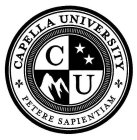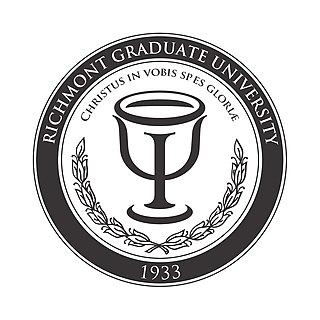Related Research Articles

A psychologist is a professional who practices psychology and studies mental states, perceptual, cognitive, emotional, and social processes and behavior. Their work often involves the experimentation, observation, and interpretation of how individuals relate to each other and to their environments.

Husson University is a private university in Bangor, Maine. It offers undergraduate and graduate degrees and as of Fall 2022 had a total enrollment of 3,065 students, including 636 graduate students in master's and doctoral programs.

Capella University is a private for-profit, online university headquartered in Minneapolis, Minnesota. The school is owned by the publicly traded Strategic Education, Inc. and delivers most of its education online.
Walden University is a private for-profit online university headquartered in Minneapolis, Minnesota. It offers bachelor's, master's, doctoral, and specialist degrees. The university is owned by Adtalem Global Education, which purchased the university in August 2021. The institution is accredited by the Higher Learning Commission.
The New York UniversitySteinhardt School of Culture, Education, and Human Development is the education school of New York University. The school was founded as the School of Pedagogy in 1890. Prior to 2001, it was known as the NYU School of Education.
The Master of Education is a master's degree awarded by universities in many countries. This degree in education often includes the following majors: curriculum and instruction, counseling, school psychology, and administration. It is often conferred for educators advancing in their field. Similar degrees include the Master of Arts in Education and the Master of Science in Education.
Guidance and counseling is a process of helping an individual become fully aware of his/ herself and the ways in which he is responding to the influence of his/her environment. Counseling is a generic term for any of professional counseling that treats dysfunction occurring within a group of related people. This term describes a preventive system of counseling that works to combat psychological impairment through the improvement and development of community support. A community is defined as a group of interacting individuals who share a commonality. This commonality can be anything from location of residence to career interest, but a community counselor will use this common characteristic to council groups of people.

Rehabilitation counseling is focused on helping people who have disabilities achieve their personal, career, and independent living goals through a counseling process.

The UNLV College of Education is an academic unit of the University of Nevada, Las Vegas (UNLV).

Palo Alto University (PAU) is a private university in Palo Alto, California that focuses on psychology and counseling. It was founded in 1975 as the Pacific Graduate School of Psychology and became Palo Alto University in 2009.
The National Board for Certified Counselors, Inc. and Affiliates (NBCC) is an international certifying organization for professional counselors in the United States. It is an independent, not-for-profit credentialing organization based in Greensboro, North Carolina. The purpose of the organization is to establish and monitor a national certification system for professional counselors, to identify certified counselors, and to maintain a register of them. NBCC also certifies Coaches through its affiliate Center for Credentialing and Education. Individuals may earn the Board Certified Coach credential through third party programs, including online programs in Life Coaching and Psychosynthesis Coaching.

Wilmington University (WilmU) is a private university with its main campus in Wilmington Manor, Delaware, with a New Castle street address. It was founded in 1968 as Wilmington College by educator Donald E. Ross. As of 2016, the university served a total student body of 20,522 undergraduate and postgraduate students in nearly 100 degree and certificate programs. The university's programs are offered at its main campus in historic New Castle as well as at six additional campuses in Delaware, several partnership locations in New Jersey, and a single partnership location in northeastern Maryland.

Richmont Graduate University is a private Christian university with campuses in Chattanooga, Tennessee and Atlanta, Georgia. It offers Master's degrees and it does so through its School of Counseling and School of Ministry. Richmont's most popular programs include its Master of Arts in Clinical Mental Health Counseling and its Master of Arts in Ministry.
Saybrook University is a private university in Pasadena, California. It was founded in 1971 by Eleanor Camp Criswell and others. It offers postgraduate education with a focus on humanistic psychology. It features low residency, master's, and doctoral degrees and professional certification programs. The university is accredited by the WASC Senior Colleges and University Commission. The university is classified an exclusively graduate institution with programs that are "Research Doctoral: Humanities/social sciences-dominant". As of Fall of 2017 the university had 785 students enrolled. The university reported 222 full-time and part-time academic faculty in 2017.
Higher education accreditation in the United States is a peer review process by which the validity of degrees and credits awarded by higher education institutions is assured. It is coordinated by accreditation commissions made up of member institutions. It was first undertaken in the late 19th century by cooperating educational institutions, on a regional basis.

Chi Sigma Iota is the international and professional academic honor society for counseling students, counselor educators, and professional counselors. CSI is an active member of the Association of College Honor Societies (ACHS), where members and the society-at-large are protected by the standards set by ACHS. The society is a professional partner of the American Counseling Association (ACA).
The University of Iowa College of Education is one of 11 colleges that compose the University of Iowa. It is located in Iowa City, Iowa. The College of Education is divided into four departments that include Educational Policy and Leadership Studies, Psychological and Quantitative Foundations, Rehabilitation and Counselor Education, and Teaching and Learning. Within those four departments, there are more than 20 specific academic programs, 500 undergraduate students, and 640 graduate students.
A licensed professional counselor associate (LPCA) is a provisionally licensed professional counselor who has completed a master’s level counseling program, passed necessary national examinations, and is currently working toward full licensure by completing a designated amount of supervised clinical counseling hours. Other common titles for this provisional license are licensed associate counselor (LAC), licensed associate professional counselor (LAPC), limited license professional counselor (LLPC), and licensed professional counselor – intern (LPC-I). Titles vary by state.

Divine Mercy University (DMU) is a private Catholic graduate university of psychology and counseling located in Sterling, Virginia.
References
- ↑ "Board Members". CACREP. Retrieved 22 July 2020.
- ↑ "CACREP Recognition". CACREP. Retrieved 10 September 2014.
- ↑ "Council For Higher Education Accreditation Summary of Recognition Status of the Council For Accreditiation of Counseling and Related Educational Programs (CACREP)" (PDF). CHEA. Retrieved 11 September 2014.
- ↑ "Programmatic Accrediting Organizations". CHEA. Archived from the original on 23 September 2014. Retrieved 11 September 2014.
- ↑ "Accreditation Information". Minnesota State University Mankato Counseling Department. Retrieved 10 September 2014.
- ↑ David Capuzzi & Douglas R. Gross. "Introduction to the Counseling Profession: Sixth Edition". Taylor & Francis. Retrieved 11 September 2014.
- ↑ "ACES, charting the future : ACES first national conference, October 7-10, 1988, in St. Louis". OCLC 19525950.
- ↑ "About CACREP". CACREP. Retrieved 10 September 2014.
- ↑ Carol Bobby (2013). "The Evolution of Specialties in the CACREP Standards: CACREP's Role in Unifying the Profession". Journal of Counseling & Development. 91: 35–43. doi: 10.1002/j.1556-6676.2013.00068.x .
- ↑ Joel F. Diambra; Melinda M. Gibbons; Jeff L. Cochran; Shawn Spurgeon; Whitney L. Jarnagin & Porche’ Wynn. "The Symbiotic Relationships of the Counseling Profession's Accrediting Body, American Counseling Association, Flagship Journal and National Certification Agency" (PDF). National Board of Certified Counselors. Retrieved 10 September 2014.
- ↑ "For Students". CACREP. Retrieved 10 September 2014.